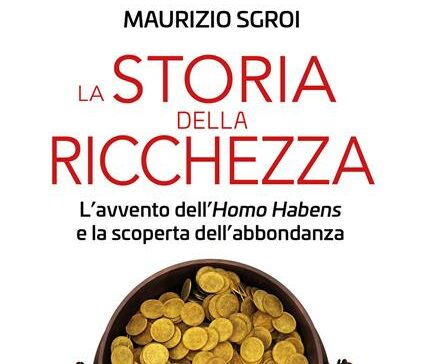Wealth is not democratic

“The Story of Wealth. The advent of Homo Habens and the discovery of abundance” by Maurizio Sgroi read by Tullio Fazzolari.
Perhaps the title of the book is a bit minimalistic. “ The Story of Wealth . The advent of Homo Habens and the discovery of abundance” by Maurizio Sgroi (Diarkos, 432 pages, 22 euros) is not just about money and wealth. In reality, wealth is a truly original ploy to tell about five thousand years of historical events in a more understandable way.
From the time of the civilization of Mesopotamia to the present day "having" is equivalent to "power". Perhaps it is no longer a written rule as it was in antiquity. But it is in reality even if today the dominant argument of the economy seems to be the debt and in particular the public debt of many states. However, unless we are short-sighted, someone else's credit always stands in front of someone's debt. Just think of the People's Republic of China which controls a large part of the US public debt.
Wealth therefore can be elsewhere but it is always there. And when it moves, as Sgroi says, it brings about great changes. The classic history textbooks have always explained quite hastily that at the origin of a revolution or a new political system there is a party or a leader or even a religious movement. The truth has always been quite different and "The history of wealth" allows you to have a more complete view.
A significant example is that of ancient Rome born under the dominion of the nobles with a rigid division by class and wealth. The plebeians begin to count in society and politics only when they begin to get rich. No more poor and no longer submissive they come to seize power. From Sgroi's book we understand that the conquest of wealth was the premise for reaching other and more important goals. The French Revolution would never have been possible if the Third Estate or the bourgeoisie had not had an extraordinary economic growth in the previous decades so as to be able to raise their voices and demand freedom and equality.
It would be legitimate to believe, at this point, that thanks to wealth it is also easier to achieve democracy. Which is true but not completely and Maurizio Sgroi's book does not fail to explain that it is not an automatic path and that the risks to be taken into account are far from negligible. Wealth is not an absolute value in itself. It's fine if the ex-poor people conquer some of it and use it to have more rights.
The decisive point for a more balanced system is however a greater diffusion of well-being. No progress is possible if wealth is concentrated in the hands of a few and therefore the goal to be pursued should be to at least partially reduce the inequalities between social classes.
Despite everything they have not disappeared even in Europe even if they seem tolerable. Dramatic inequalities remain in other continents such as Africa and Latin America. The dream is that in the future the wealth to come will leave no one behind. And hope it's not just a dream.
This is a machine translation from Italian language of a post published on Start Magazine at the URL https://www.startmag.it/economia/la-ricchezza-non-e-democratica/ on Sat, 18 Feb 2023 07:58:12 +0000.
